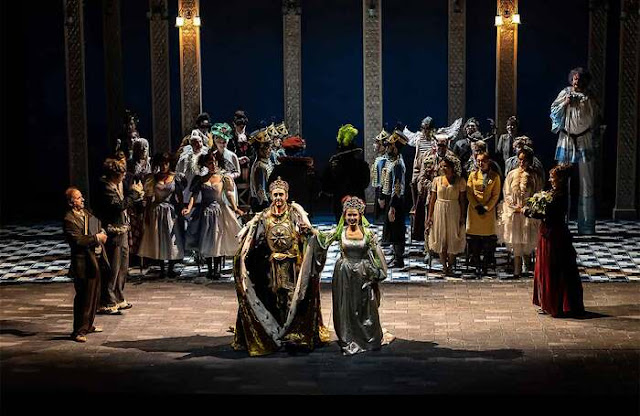WFO, 30/10/2022
David : Lalla-Roukh
Chorus and Orchestra of Wexford Festival Opera
Steven White
Félicien David was a near-exact contemporary of Berlioz, and whose work - some of it, at least - Berlioz, a notoriously acerbic critic, particularly of his contemporaries, actually admired. Amongst much else, David composed five operas, most of which classify as opéra-comique, and the most successful of which was Lalla-Roukh (1862), based on Sir Thomas Moore's eponymous 'oriental romance'. Moore is, of course, to Ireland what Burns is to Scotland, and his mother came from Wexford, so there was a very clear link which the director Orpha Phelan did not hesitate to exploit to stage this work.
Lalla-Roukh, quite aside from anything else, belongs to that category of works that has difficulty being staged these days, because of issues of colonialism, or cultural appropriation, or generally politically incorrect attitudes towards non-Western cultures. Musically, there's not too much 'orientalism' in the score, although David had travelled and resided in the Middle East, unlike many of his colleagues who similarly wanted to evoke the fantastic world of the Thousand and One Nights. However, David's music evades most of the obvious clichés, which allowed Phelan to place the whole thing in a completely different context.
During the overture, what we see is an attractive, slightly old-fashioned-looking tea shop, Leila O'Rourkh's Tea Emporium, just opening for the day. Customers arrive and are served, while in the foreground, a vagrant pushing a supermarket trolley goes dumpster diving for food or other items that might be saleable. In his search, he comes across an old book, Moore's Lalla Rookh, which he begins to read, intrigued, and suddenly, the facade of the tea-room lifts, and the chorus appears in a myriad of fantastical guises, like a carnival or circus troupe, often inspired by Irish mythology, and we go on to observe the whole proceedings through the imagination of this captivated narrator.
Opéra-comique normally features a significant quantity of spoken dialogue, which may be more or less successful, but rarely translates well. Phelan has removed all of that to replace it with a narration, delivered by the vagrant, in rhyme, which summarises, often quite wittily, the action in-between the numbers, and reinforces the personal connection that character has to the story. Also, this narrator fits right into the Arabian mould of the story-teller, a common feature in their narrative, who 'translates' for the public, and so the strongly Irish text delivered, superbly, by Lorcan Cranitch, was entirely in keeping with the concept. As productions go, this one was inspired, attractive, inventive and delightful.
 |
| Lalla-Roukh, Act 2 finale Lorcan Cranitch (Narrator, left), Pablo Bemsch and Gabrielle Philiponet (Nourredin and Lalla-Roukh, centre) © Clive Barda (2022) |
Musically, too, the evening was quite delightful. It's not, perhaps, music that remains indelibly inscribed in the memory - a couple of hours after leaving the theatre, I can't really remember any single tune. However, the overall impact is fresh, charming, touching and comic when appropriate, and delivered, by the whole cast, chorus and orchestra under Steven White, with zest and flair. As was traditional in this genre, there are two couples, one lyrical and romantic, the leads, and the second comic. Of the first pair, Gabrielle Philiponet was a sweet, yet confident Lalla-Roukh, but Pablo Bemsch, though competent, lacked a similar sweetness of timbre. The tenor lead of Nourreddin needs a voice like Yann Beuron, twenty years ago, or Cyrille Dubois now, and Bemsch was a little acid-toned for that, though he was ardent enough in presentation, The comic couple of Mirza and Baksir (Niamh O'Sullivan, and the excellent Ben McAteer) were perfectly judged, however, knowing just when to play for laughs, and when to play serious.
Lalla-Roukh was the title that had attracted me to this year's edition of the Wexford Festival in particular. I've known bits and pieces of it from old recordings for a long time, aware that at one time it was very popular, but has now sunk into obscurity. While I maintain that it's not a work of imperishable genius, and its music has not carved itself into my memory, its appeal was evident and undeniable, and it was a real pleasure to make its acquaintance in this imaginative setting, and in these inspired hands.
[Next : 31st October]
